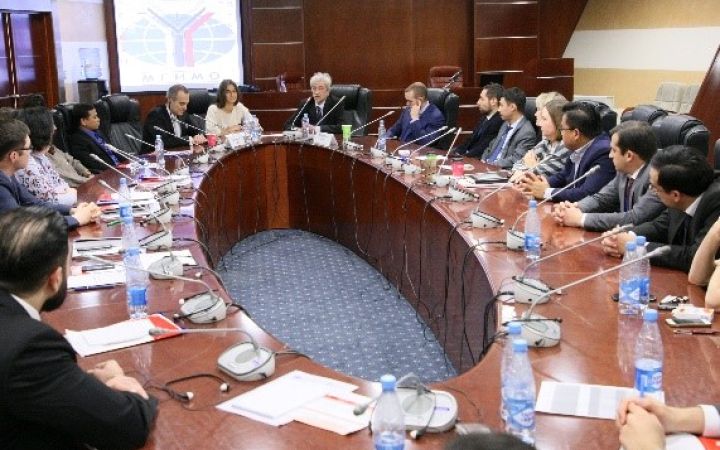19 - 23 November 2018, Russia – As part of the cooperation agreement between the Government of the Russian Federation and the United Nations Institute for Training and Research (UNITAR), an annual Regional Capacity Development Programme was implemented. The general theme of the Programme was “Regional Integration Organisations as a Factor of the Modern Politics: opportunities and risks for CIS and other countries”. This annual capacity development activity was jointly organized by the Moscow State Institute of International Relations (MGIMO-University) and UNITAR.
The programme comprised several sessions encompassed within a week of training. The Programme took place at the MGIMO’s campus in Moscow and was implemented by both MGIMO Professors and external experts. Through the five-day training programme, 22 participants representing the Russian Federation, as well as Kazakhstan, Belarus, Azerbaijan, Uzbekistan, Ukraine, Syria and Cambodia, got acquainted with knowledge regarding different issues related to Regional Integration Agreements across the European Union, the Eurasian Economic Union, as well as the North American Free Trade Agreement, and other attempts of regional cooperation. The main goal programme was to promote a more effective international cooperation in regional integration, and the compliance with international norms and regional agreements by enhancing the capacities of practicing professionals (more specifically mid-career and junior government officers) in the CIS region.
On the first two days of the workshop, Dr. Kaveshnikov delivered several sessions on the institutional dynamics of the European Union. He further explained the foreign policy of the EU and its role in the system of international relations. Dr. Kaveshnikov concluded his session by explaining the crisis and the need for transformation of the EU. After the morning session, participants had the chance to visit the Kremlin Museums. Subsequently, Dr. Tsibulina leaded two workshops on the European Single Market and the current economic challenges in the Eurasian Economic Union. The session was followed by Ms. Butorina, from the Institute for Europe, she delivered a session titled “The goals of the single European currency: declarations and reality”, followed by two sessions from Dr. Bolshova on “The Eurasian Economic Union: evolution and modalities of operation” and “Freedom of movement and labor mobility in regional integration organizations”. On the same day, a session on “The Activities of the Eurasian Development Bank” was given by Mr. Vinokurov. The fourth day of workshop was divided in four different sessions on the operational modalities, achievements and challenges of NAFTA, SCO as a stabilizing factor for Eurasia, BRICS, and ASEAN. These sessions were respectively led by Mr. Tevdoy-Burmuli, Mr. Lukin, Ms. Okuneva, and Mr. Sumsky. Moreover, on the last day of workshop, Mr. Luzyanin conducted a session on One Belt One Road Initiative as an integration project, followed by a session on comprehensive greater Eurasian Partnership, which was delivered by Dr. Entin. Lastly, Ms. Strezhneva led a session on “Regional Integration in a Multi-Polar World”.
In conclusion, the Q&A session at the end of each session made the programme even more interactive. The various components and sessions of this programme were a success as they received highly positive feedback from participants. In the post-event evaluation, 89% of the participants stated that they would recommend this course. Furthermore, 89% of the respondents expressed their satisfaction stating that the workshop was very useful, and they would be likely to use the information acquired. The participants received a certificate of participation recognising the knowledge acquired.
Photo: Participants and UNITAR experts on the first day of the workshop.


